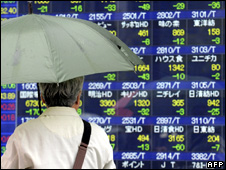 Greek regulators have announced a ban on short-selling on Greece's stock market, following steep falls in bank shares.
Greek regulators have announced a ban on short-selling on Greece's stock market, following steep falls in bank shares.The ban is designed to prevent investors betting on falls in share prices - believed to undermine confidence in the market.
On Tuesday, Greek bank shares fell 9% amid continued concern over Greece's public finances.
The move also follows big falls in Asian markets on Wednesday.
Japan's leading share index, the Nikkei 225, closed down more than 2.5% after steep falls in European stocks on Tuesday.
Shortly after opening on Wednesday, stock markets in Frankfurt and Paris were both down by a further 0.5%.
The short-selling ban, designed to stabilise the market, only affects stocks listed in Greece, however.
Global shares have tumbled after the credit rating agency Standard and Poor's downgraded Greek debt to "junk" on Tuesday.
That means the rating agency views Greece as a much riskier place to invest, and increases the interest rate investors will charge the Greek government for loans.
'No restructure'
On Wednesday, that interest rate hit 10.13% for 10-year Greek bonds - another all-time high for a eurozone country.
Meanwhile plans to secure a bail-out for the Greek economy will continue later, with the International Monetary Fund (IMF) arriving in Berlin to urge German MPs to agree to a rescue deal.
Dominique Strauss-Kahn will travel to Germany along with the president of the European Central Bank, Jean-Claude Trichet, to persuade politicians that giving Greece billions of euros in aid is a "last resort".
Progress on a deal to bail out Greece may also help to steady investors' nerves.
During a visit to Tokyo on Wednesday, European Council President Herman Van Rompuy announced a meeting of eurozone heads of state and government would be held on 10 May to discuss the Greek crisis.
He insisted negotiations on the aid were "well on track" and that there was "no question about restructuring" Greek debt.
Meanwhile, the Financial Times newspaper in the UK reports that the IMF is considering raising its contribution to the bail-out by 10bn euros ($13.3bn; £8.7bn) to 25bn euros.
Correspondents say the idea of a bail-out is unpopular with the German public, which doubts it will save Greece from going bankrupt.
Greece needs to secure at least some of the funding by mid-May, when it is due to repay investors around 8.5bn euros of debt.
In Greece itself, demonstrators called for the country to default on its debts, so that foreign banks would pay the price for the crisis.
Contagion risk
The concern among investors now is that the loss of confidence in Greece could spread to other weak eurozone economies.
On Tuesday, Standard & Poor's also cut Portugal's credit rating by two notches to A-, amid concerns about its public finances.
Some investors have expressed concern that the current market jitters could turn into something much bigger.
"We have the makings of a market crisis here," Neil Mackinnon, a global macro strategist at VTB Capital, told the Associated Press news agency.
Germany's willingness to help Greece out is one major concern.
On Tuesday, German Chancellor Angela Merkel reiterated that Greece had to first outline further steps to reduce its budget deficit before her government would endorse the release of funds for a 45bn euro rescue package.
"You have to economise, you have to become fair, you have to be honest; if not, nobody can help you," she warned the Greek people.
A selection of your comments may be published, displaying your name and location unless you state otherwise in the box below.



